ISLAMABAD: The ruling Pakistan Muslim League-Nawaz (PML-N) party said on Wednesday it was ready to welcome the return of former prime minister Imran Khan’s political faction to the National Assembly while ruling out the possibility of snap national elections.
Khan’s Pakistan Tehreek-e-Insaf (PTI) party decided to constitute a committee to discuss the options of returning to the lower house of parliament from which it resigned last April while trying to mount pressure on Prime Minister Shehbaz Sharif’s coalition administration to call early general elections.
The development came after the PTI dissolved the assemblies of Punjab and Khyber Pakhtunkhwa provinces this week where it was in power while deciding to return to the National Assembly to appoint its own leader of the opposition to participate in the deliberations related to the appointment of the next caretaker administration in the country.
“We are ready to welcome the PTI back in parliament, but there is zero chance of early national elections,” Saad Waseem, PML-N’s secretary parliamentary affairs, told Arab News.
Last year, speaker National Assembly Raja Pervez Ashraf appointed a PTI dissident Raja Riaz as the opposition leader in the house after Khan’s party resigned. Riaz enjoys the support of about 16 other PTI dissident members.
“Once the PTI returns to the National Assembly, we will see if they have the numbers to get their opposition leader appointed,” Waseem continued. “The democratic process will be followed, and the decision will be made as per the rules and procedures of the assembly.”
The parliamentary secretary said the provincial elections will be held in Punjab and Khyber Pakhtunkhwa provinces after the dissolution of their assemblies as per the constitution, adding the federal government would continue to stay in power until it finishes its term in August.
Khan was ousted from power in a parliamentary vote of no-confidence last April and has since been mounting pressure on the federal authorities to call early national elections.
In a setback to PTI’s plan of return to the national legislature, the speaker on Tuesday accepted 35 more resignations of the party, including one of Sheikh Rashid Ahmed, to thwart the move. In July, the speaker accepted 11 resignations of PTI members while elections were held on nine seats and Khan returned as winner on seven.
As per the National Assembly tally, the PTI still enjoys the support of about 80 lawmakers and can get its own leader of the opposition appointed.
“We are preparing to go back to the National Assembly to bring our opposition leader, so that a proper consultative process for the installation of the caretaker government can begin at the center,” Farrukh Habib, PTI’s central secretary information, told Arab News.
He said it was mandatory for the prime minister to consult the opposition leader before installing the caretaker prime minister as per the constitution, adding this was the reason why the PTI wanted “to remove the dummy opposition leader” in the house.
Habib said Khan, who is also the PTI chairman, had constituted a committee to discuss all available options to become part of the assembly, “and we will soon be making a final decision on it.”
The constitution says the president will appoint the caretaker prime minister in consultation with the prime minister and the leader of opposition in the outgoing National Assembly.
“The PTI will not participate in any formal proceeding of the assembly to validate the government but play its constitutional role for the early national elections,” he added.
PM Sharif’s party ready to ‘welcome’ PTI in parliament, rules out snap elections in Pakistan
https://arab.news/rtjrd
PM Sharif’s party ready to ‘welcome’ PTI in parliament, rules out snap elections in Pakistan
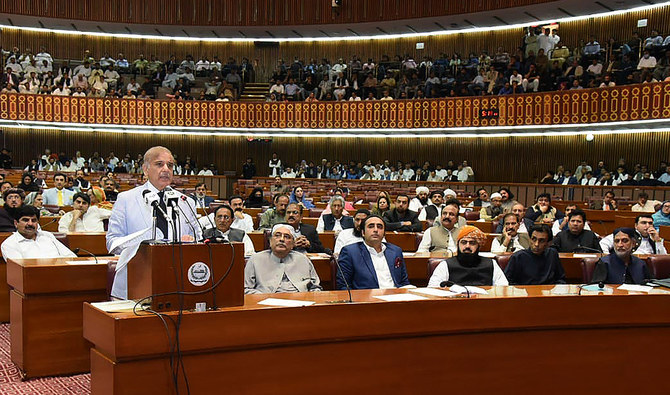
- PTI resigned from the National Assembly last April after former prime minister Imran Khan was ousted from power
- Khan’s party wants to bring its own leader of the opposition to participate in the process of appointing caretakers
Planning minister says Saudi Arabia to invest $5 billion to boost Pakistan’s economy
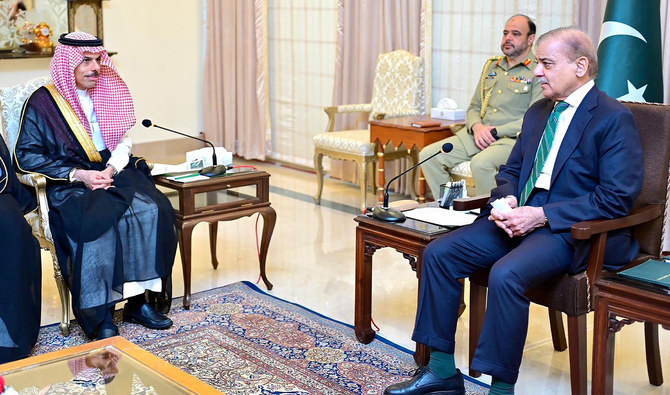
- Ahsan Iqbal says the national economy can reach a $3 trillion mark by 2047 with 9% growth rate
- He informs a summit the government plans to maximize investment from UAE, Kuwait and Qatar
KARACHI: Federal Minister for Planning and Development Ahsan Iqbal announced on Tuesday Saudi Arabia was expected to invest $5 billion in Pakistan, adding the administration in Islamabad was also trying to secure investment from other Gulf states to strengthen the national economy.
Amid economic challenges, Pakistan has been actively trying to attract foreign investment and established the Special Investment Facilitation Council (SIFC), a civil-military hybrid body, last year for the purpose.
The SIFC was created to serve as a single window for all foreign investment activities, offering a simplified and more direct route for international investors interested in various sectors such as mining, agriculture, energy, information technology and defense manufacturing.
The body was tasked to address procedural bottlenecks, accelerate policy reforms and create a more favorable investment climate, with a special focus on Gulf economies.
“Saudi Arabia will soon invest $5 billion in Pakistan and in this regard, Prime Minister Shehbaz Sharif will soon visit Saudi Arabia, followed by an expected visit of the Saudi Crown Prince Mohammed bin Salman to Pakistan,” the Planning Commission of Pakistan quoted the minister as saying in an official statement.
Iqbal issued the statement while speaking at a business summit in Islamabad.
He mentioned that discussions were ongoing with the United Arab Emirates, Kuwait and Qatar to maximize investment in Pakistan.
The planning minister said if Pakistan managed to increase its exports to $100 billion in the next seven to eight years, it would achieve a significant economic takeoff.
He maintained that Pakistan could become a $2 trillion economy by 2047 with 7 percent growth, adding it could also reach a $3 trillion mark by maintaining 9 percent growth.
Pakistan, Saudi Arabia and Uzbekistan ink ‘landmark’ agreement to promote trade, investment

- As per agreement, Uzbekistan’s largest bank and a Pakistani firm will support investors in all three countries
- Partnership to attract foreign investment particularly in key sectors of energy, infrastructure and agriculture
ISLAMABAD: Pakistan, Saudi Arabia and Uzbekistan have signed a “landmark” partnership agreement to boost economic cooperation and create new opportunities for investors in the region, Pakistan’s state-run television reported on Tuesday.
As per the terms of the agreement, Uzbekistan’s largest bank Ansher Capital will work closely with KASB Securities Limited (KASB), a leading Pakistani stock and commodity brokerage firm, to provide financial advisory and corporate finance services to investors in all three countries, the state media said.
Both firms will support investors and traders in Pakistan, Uzbekistan and Saudi Arabia by providing expert guidance on navigating financial markets, the Pakistan Television (PTV) said.
“In a significant development, Uzbekistan, Pakistan, and Saudi Arabia have signed a landmark partnership agreement aimed at promoting investment and trade between the three countries,” PTV said.
“The partnership is expected to expand the market and attract foreign investment, particularly in key sectors such as energy, infrastructure, and agriculture.”
The report said that the agreement is also expected to strengthen trade ties between the three countries, with a focus on increasing trade volumes and promoting economic integration.
“The partnership will enable businesses to tap into new markets and access new investment opportunities, creating jobs and driving economic growth,” PTV said.
Pakistan and Saudi Arabia enjoy strong trade, defense and cultural ties. The Kingdom is home to over 2.7 million Pakistani expatriates and serves as the top destination for remittances to the cash-strapped South Asian country.
Saudi Foreign Minister Prince Faisal bin Farhan arrived in Pakistan last week for a two-day visit aimed at strengthening bilateral economic cooperation and pushing forward previously agreed investment deals. Pakistan has said it pitched investment projects worth $30 billion to Riyadh during Prince Faisal’s visit.
Islamabad has sought trade and economic partnerships with bilateral partners and allies as it seeks to navigate a macroeconomic crisis that has seen its reserves plummet to historic lows and its currency weaken significantly.
Pakistan’s finance minister says new IMF loan agreement targeted for early July
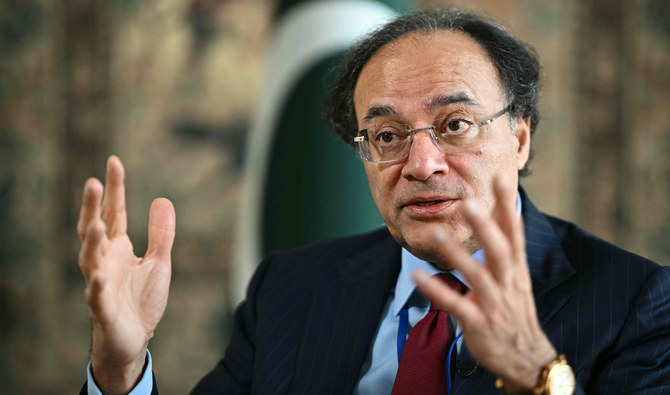
- The quantum and duration of new loan is still not clear, though the government wants at least a three-year program
- Muhammad Aurangzeb says the modalities of the new loan will be thrashed out with an IMF delegation next month
ISLAMABAD: Pakistan’s finance minister Muhammad Aurangzeb said on Tuesday the country planned to discuss the contours of a new loan program with an International Monetary Fund (IMF) delegation next month while hoping to reach a staff-level agreement with the global lender by early July.
Pakistan secured a $3 billion IMF bailout last year to avert a sovereign default and hopes to receive the final tranche later this month. However, the government wants a fresh IMF loan since the country continues to face tough economic challenges and plans to implement structural reforms.
“We are still hoping that we can get into a staff-level agreement by the time June is done or early July so that we can move on,” the finance minister said while addressing a news conference.
He informed he had good discussions with IMF and World Bank officials during the spring meetings held by both international lending organizations in Washington.
Aurangzeb maintained it was not right to say that the IMF was imposing strict conditions on Pakistan since the country needed to carry out reforms on its own to strengthen its economy.
“This is Pakistan’s program which is helped, supported, assisted by the fund,” he said. “This is how we have to see it since this is the way ownership will come.”
He maintained the country’s foreign reserves were increasing and would reach about $10 billion by the end of June this year well before the new IMF program.
“Once the final tranche comes from the IMF, end of this week, we will be over $9 billion,” he told the media. “By the time we end June, we will be anywhere between $9-10 billion, which is going to be equivalent to two months of import cover.”
The finance minister noted the country had made progress since its foreign reserves dipped to nearly $3.4 billion last year.
He said the stock market was also hitting all-time highs and foreign buyers were entering the market.
“The gross domestic product growth is expected to be at 2.6 percent in the current fiscal year,” he said, adding the government was taking steps to attract foreign investment and keep the current account and fiscal deficits within reasonable limits.
“The current account deficit has been reduced to $1 billion after a 74 percent reduction in FY24,” the minister said, adding the inflation was expected to remain at 24 percent during the ongoing fiscal year, while the trade deficit had been reduced to $17 billion following a 24.9 percent decrease.
He said the quantum and duration of the new IMF program was yet not clear, though the government wanted to secure at least a three-year loan package.
Pakistan and IMF have said they are already in discussions for the new loan.
Aurangzeb said structural reforms carried out by the government include increasing the government’s tax revenue-to-GDP ratio to 13 percent to 14 percent in next two or three years from the current level of around 9 percent, reducing losses of state-owned enterprises through their privatization, and better management of the debt-laden energy sector.
With input from Reuters
Pakistan refiners warn $6 bln upgrades at risk due to fuel price deregulation plan
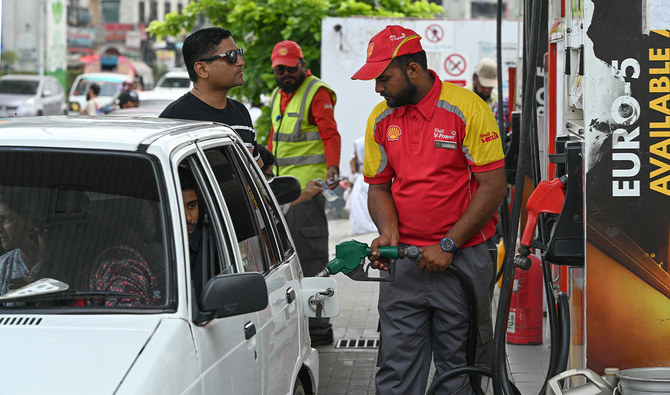
- Regulatory authority proposes oil marketers, refineries be allowed to set prices instead of government
- Refiners demand they be consulted before the implementation of “irrational recommendations”
KARACHI: Pakistan’s plans to deregulate fuel prices could lead refiners to halt planned upgrades worth up to $6 billion and force some refineries to close, some of the country’s top refiners said in a letter to the country’s oil regulator.
Looking to drive down prices for consumers, the South Asian nation’s Oil & Gas Regulatory Authority (OGRA) has proposed that oil marketers and refineries be allowed to set fuel prices, instead of the government setting prices.
As part of the change, OGRA proposed scrapping or reviewing a rule that requires fuel buyers to purchase supply from local refineries, another issue the refiners said could result in “disastrous consequences.”
The refiners — state-run Pakistan Refinery and private domestic refiners Pak Arab Refinery, Attock Refinery, Cinergyco, and National Refinery — said they were already struggling to operate near full capacity and asked that they be consulted before the implementation of “irrational recommendations.”
“The refining sector requires OGRA support through pragmatic and supportive measures, rather than suggesting ways that if implemented would result in their permanent closure,” the refiners told OGRA on Monday in a letter, which was reviewed by Reuters.
The deregulation was aimed at boosting competition and protecting the public interest, OGRA told Reuters in a statement on Tuesday, but did not respond to specific questions on the letter from the refiners. However, it said in an April 17 presentation reviewed by Reuters the potential impact of deregulation on refinery upgrades had to be assessed carefully, calling it a challenge.
“The refineries upgradation will bring in investment of $5 — 6 billion and not only result in cleaner environment friendly fuels but also result in savings of precious foreign exchange of the country,” the refiners wrote in the letter to OGRA.
Pakistan hopes to get new IMF loan by early July, says finance minister
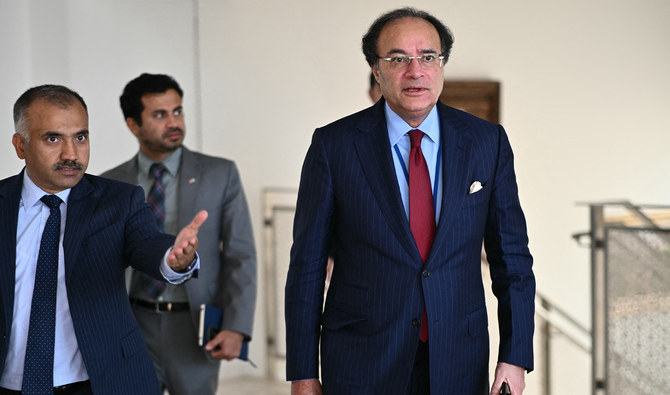
- Pakistan’s current $3 billion financial arrangement with IMF expires in late April
- Islamabad is seeking “bigger,” long-term loan to ensure macroeconomic stability
Pakistan is hoping to reach a staff-level agreement with the International Monetary Fund by June or early July, its finance minister said on Tuesday.
The country’s current $3 billion arrangement with the fund runs out in late-April, which it secured last summer to avert a sovereign default.
Islamabad is seeking a long-term bigger loan to help bring permanence to macroeconomic stability as well as an umbrella under which the country can execute structural reforms.
“We are still hoping that we get a staff-level agreement by June or early July,” Finance Minister Muhammad Aurangzeb told a conference in Islamabad.
He returned from Washington last week after leading a team to attend the IMF and World Bank’s spring meetings. “We had very good discussions in Washington,” he said.
He said he did not know at this stage the volume and tenure of the longer program.










